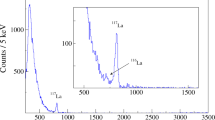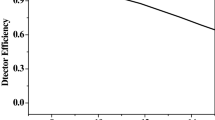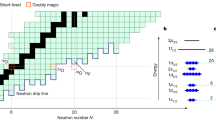Abstract
FLEISCHMANN1 and Rassetti2 have investigated the absorption of -rays excited in various elements by slow neutrons, and found quantum energies ranging from 2 × 106 to 5 × 106 e.v. When, however, -rays originate in a process of neutron fixation leading to the formation of a stable element, as, for example, in the case of cadmium, one would expect from mass-spectroscopic data essentially higher energies of the order of 10 × 106 e.v.
This is a preview of subscription content, access via your institution
Access options
Subscribe to this journal
Receive 51 print issues and online access
$199.00 per year
only $3.90 per issue
Buy this article
- Purchase on Springer Link
- Instant access to full article PDF
Prices may be subject to local taxes which are calculated during checkout
Similar content being viewed by others
References
Z. Phys., 97, 242 (1935) and 47, 265 (1935).
Z. Phys., 97, 64 (1935).
cf. Hulme, Proc. Roy. Soc., A, 138, 643; (1932) and Taylor and Mott, Proc. Roy. Soc., A, 138, 665; (1932).
Jaeger and Hulme, Proc. Roy. Soc., A, 148, 708; (1935).
Author information
Authors and Affiliations
Rights and permissions
About this article
Cite this article
HERSZFINKIEL, H., WERTENSTEIN, L. Absorption of -Rays Excited in Cadmium by Slow Neutrons. Nature 137, 106–107 (1936). https://doi.org/10.1038/137106a0
Issue Date:
DOI: https://doi.org/10.1038/137106a0
Comments
By submitting a comment you agree to abide by our Terms and Community Guidelines. If you find something abusive or that does not comply with our terms or guidelines please flag it as inappropriate.



